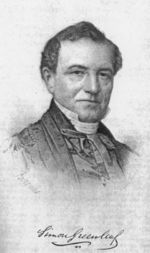Christian legal apologetics
 From Conservapedia - Reading time: 3 min
From Conservapedia - Reading time: 3 min
Christian legal apologetics is a branch of Christian apologetics that affirms that the available evidence to defend Christianity argues for the veracity of the historical and central claims of Christianity when Western legal standards of weighing evidence are applied. An area that has received considerable attention in the field of Christian legal apologetics is the resurrection of Jesus Christ. Legal scholars, legal authorities, an eminent lawyers such as Simon Greenleaf, John Warwick Montgomery, Lord Darling, John Singleton Copley, Hugo Grotius, Lord Caldecote, J. N. D. Anderson, Lionel Luckhoo, and many others have asserted that western legal standards argue for the resurrection of Christ.[1]
Dr. Simon Greenleaf was one of the chief figures in the early days of the Harvard Law School, a legal scholar, and also served as a Royall Professor at Harvard Law School.[2][3] In addition, Greenleaf was the author of the classic three-volume text, A Treatise on the Law of Evidence (1842) and according to Dr. Wilbur Smith this work "is still considered the greatest single authority on evidence in the entire literature on legal procedure.” [4] In his essay the Testimony of the Evangelists Examined by the Rules of Evidence Administered in Courts of Justice, Greenleaf wrote the following:
| “ | All that Christianity asks of men…is, that they would be consistent with themselves; that they would treat its evidences as they treat the evidence of other things; and that they would try and judge its actors and witnesses, as they deal with their fellow men, when testifying to human affairs and actions, in human tribunals. Let the witnesses [to the Resurrection] be compared with themselves, with each other, and with surrounding facts and circumstances; and let their testimony be sifted, as if it were given in a court of justice, on the side of the adverse party, the witness being subjected to a rigorous cross-examination. The result, it is confidently believed, will be an undoubting conviction of their integrity, ability and truth.[5] | ” |
Greenleaf's work influenced many subsequent Christian juridical apologists.[6]
Recommended Reading[edit]
- John Warwick Montgomery, "The Jury Returns: A Juridical Defense of Christianity," in Evidence For Faith: Deciding the God Question, edited by John Warwick Montgomery,(Dallas: Probe, 1991), pp. 319–341. ISBN 0-945241-15-1
- Ross Clifford, John Warwick Montgomery's Legal Apologetic: An Apologetic For All Seasons. Verlag für Kultur und Wissenschaft/Culture and Science Publishers, Bonn. 2004.
- Craign A. Parton, The Defense Never Rests: A Lawyer's Quest for the Gospel. Concordia Publishing House, St. Louis, Missouri. 2003.
- Pamela Binnings Ewan. Faith on Trial: An Attorney Analyzes the Evidence for the Death and Resurrection of Jesus. Broadman & Holman, Nashville, Tennessee. 1999. ISBN 0-8054-2026-6
- Hoffman, Paul K. – “A Jurisprudential Analysis Of Hume’s ‘In Principal’ Argument Against Miracles,”Christian Apologetics Journal, Volume 2, No.1, Southern Evangelical Seminary, Spring, 1999
- Ross, Clifford, Leading Lawyers' Case for the Resurrection, (Edmonton: Canadian Institute for Law, Theology and Public Policy, 1996), pages 41–55. ISBN 1-896363-02-4
- Joseph Evans Sagebeer, The Bible in Court, reprint edition, (Littleton: Fred B. Rothman, 1988). ISBN 0-8377-2620-4
- Irwin H. Linton, A Lawyer Examines the Bible, (Grand Rapids: Baker Book House, 1977). ISBN 0-8010-5565-2
- Howard Hyde Russell, A Lawyer's Examination of the Bible, (Westerville: Bible Bond, 1935).
- Stephen D. Williams, The Bible in Court or Truth vs. Error, (Dearborn: Dearborn Book Concern, 1925).
- Francis J. Lamb, Miracle and Science: Bible Miracles Examined by the Methods, Rules and Tests of the Science of Jurisprudence as Administered Today in Courts of Justice, (Oberlin: Bibliotheca Sacra Company, 1909).
See also[edit]
External links[edit]
- Legal apologetics
- The Jury Returns: A Juridical Defense of Christianity — An excerpt from Evidence for Faith Chapter 6, Part 2 by John Warwick Montgomery
- Justification of the Legal Apologetic of John Warwick Montgomery: An Apologetic for All Seasons
- Testimony of the Evangelists by Simon Greenleaf
- A Jurisprudential Analysis of Hume's 'In Principle' Argument Against Miracles by Paul K. Hoffman
- Juridical Apologists 1600-2000 AD: A Bio-Bibliographical Essay by Phillip E. Johnson
 KSF
KSF